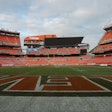Copyright 2017 Dayton Newspapers, Inc.
Dayton Daily News (Ohio)
LOS ANGELES – After a visit to evaluate Los Angeles' bid for the 2024 Summer Olympics, the International Olympic Committee's commission couldn't pick one adjective to describe the proposed venues.
So it chose many, all superlative, to describe what the group had seen over its three-day visit last week.
As that commission takes its tour of Paris, which concludes Tuesday, it is LA 2024's venue plan that left the impression that bid leaders had hoped for. That plan, one that does not require the construction of any permanent venues, is one they hope can help them secure the Games.
"The commission members were almost ecstatic about the level of the venues that they've found and that they've seen and that they've been able to meet those people that manage those venues," said Patrick Baumann, chairman of the IOC's evaluation commission. "It goes from spectacular venues to impressive venues to mind-blowing venues to incredible venues. That certainly is an incredibly positive thing. And it's positive because we've been able to really see them."
The commission's tour Thursday included nearly all the venues, including iconic sites such as the Rose Bowl and Coliseum. IOC evaluators took basketball shots on the Staples Center court. And they toured the campuses of UCLA and Southern California, where the athletes and media villages, respectively, would be located.
"It's certainly an incredible asset to be able to have a village that we could walk them through," LA 2024 chairman Casey Wasserman said. "It wasn't about greenfield sites or blueprints. It was about touching and feeling."
IOC members who will select a 2024 (and maybe also a 2028) host in September don't have to reveal how they voted or why. But, ostensibly, the importance of venues should play a role under Agenda 2020, a series of reforms that aims to cut the cost of bidding and make the Games more sustainable by encouraging the use of existing venues, among other things.
That change, in effect for the first time in this bidding process, comes in response to a history of cost overruns that have left previous host cities with white elephants, causing budgets to skyrocket and serving little use beyond the Games.
"What we're seeing with the venues is the fundamental problem with the Olympics," said Victor Matheson, an economist at Holy Cross who has studied the cost of hosting the Games. "The Olympics has so many extremely specialized sports that the venues become really problematic."
It's often difficult, for example, to find sustained use for things such as a cycling velodrome or a canoeing course. Los Angeles' bid would require extensive retrofitting — including the installation of a track in the Coliseum — and temporary venues, but it would not require any permanent construction.
Paris, the only other city bidding against Los Angeles, would have to build an athletes village – usually one of the most costly venues to construct — and a swimming pool.
LA 2024 fielded questions about its use of sports parks, with four proposed to foster cost reduction through shared resources rather than having one large Olympic park. The plan would make it easier for fans to see multiple events in one zone.
To be sure, it is still a plan. Should Los Angeles be awarded the Games, the hard work would be in the construction of temporary venues and retrofitting of current ones.
But for the most part, bid organizers stuck to their message. Look at our venues. They already exist. Rather than blueprints, LA 2024 posted large plexiglass displays outside of the venues showing what they would look like during the Olympics.
At the site of the NFL stadium to be completed in Inglewood by 2019, IOC evaluators saw a virtual reality video of what it would look like with Wasserman explaining how it would suit the Olympics.
By all accounts, it was a wow moment on a visit in which IOC commission members only had to see to believe what an Olympics in Los Angeles would look like.
"This visit has certainly confirmed our opinion that Los Angeles has developed an excellent proposal, and, probably, given the facilities that are available here and what is already ready, seven years of lead time is a luxury here in this city," Baumann said. "We've seen excellent venues, including legacy venues from the 1932 and 1984 Games. And those venues remind us that smart planning leads to great Olympic legacies.
"Los Angeles is already a great Olympic city, but after these three days, we now realize that was an understatement."
Read More of Today's AB Headlines
Subscribe to Our Daily E-Newsletter
Terms and Conditions Privacy Policy



































